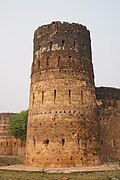Keoti Fort
This article needs additional citations for verification. (January 2024) |
| Keoti Fort | |
|---|---|
| Part of Madhya Pradesh, | |
| Rewa District, Madhya Pradesh, India | |
 Keoti Fort, front and south side, ca. 2024 | |
| Coordinates | 24°49′02″N 81°27′26″E / 24.81714°N 81.45725°E |
| Type | Fort |
| Site information | |
| Open to the public | yes |
| Condition | dilapidated |
Keoti Fort (also Keonti Fort) is an Indian fortress (qila) situated on the Rewa Plateau about 53 kilometres (33 mi) north-east of the city of Rewa, in Rewa district in the Indian state of Madhya Pradesh.
History
[edit]Keoti Fort is said to have been constructed by Raja Parmal Dev in 1500 AD.[1] mentioned in an account of the Indian Rebellion of 1857. Thakur Ranmat Sinha, a leader in the Rebellion in Rewa State, went into hiding near Keoti Fort. In an encounter at the fort, he killed a British officer who had come to arrest him. Eventually, he surrendered at the urging of the Maharaja Raghuraj Singh who supported the British. He was hanged in 1860 for the murder of the British officer.[2][3]
Geography
[edit]Keoti Fort is situated on the Rewa Plateau near the northern end of the Vindhya Escarpment.[4] The fort is built on the right bank of a ravine that the Mahana River has cut into the escarpment. The 98 m (322 ft) high Keoti Falls is on the opposite side of the ravine, visible from the northern part of the fort. The elevation of Keoti Fort is 280 m (920 ft) above mean sea level.[citation needed]
Keoti Fort is about 53 km (33 mi) from the city of Rewa.[5] The nearest airport is located at Prayagraj (Allahabad) in Uttar Pradesh, a distance of 114 km (71 mi).[6]
Architecture
[edit]


The west wall of the fort runs along the Mahana ravine for about 200 m (660 ft). The south wall extends about 100 m (330 ft) east from the ravine. The east wall with the main entrance is about 40 m (130 ft) long. There after, the fort depth narrows to about 25 m (82 ft) at the northern end of the fort. The total area enclosed by the walls is about 1.0 ha (2.5 acres). Towers are located at the corners of the outer walls.[citation needed]
The construction material is stone and clay mortar. Loopholes with three angles of fire are built into the outer walls at regular intervals and at various heights. These are useful for defense against enemy coming across the flat plateau.[citation needed]
Tourism
[edit]
The fort is open to the public. Entrance is free (January 2024).[citation needed] Fairs are held annually which attract many people. The carvings and stone artefacts, the natural beauty and the view of the Keoti Falls across the gorge behind the fort are attractions that draw visitors.[1]
Controversies
[edit]In 2016, the MP Government denotified the fort as a "protected heritage site" and transferred it to the Madhya Pradesh Tourism Board to be developed as a heritage hotel. In July 2021, the MP Tourism Board issued a tender for development of the Keoti Fort.[7] However, it was reported that the fort had not been leased out and was falling into a state of disrepair.[8] A local news report claims that the fort is being neglected by the administration and is frequented by petty criminals. These factors may deter tourists.[1]
Popular culture
[edit]The Hindi movie Bindhi aur Bandook (1972) was shot at Keoti Fort.[1]
Gallery
[edit]Exterior views
[edit]-
Front (east) facade
-
Front and north side
-
Tower on south-east corner
-
Gorge of the Mahana River behind the fort
Interior views
[edit]-
Inside south-west part, tower overlooking the ravine, loopholes near the top of the wall
-
Northern inside of the fort: ravine on left, north wall in centre, east wall on right
-
Loophole in outer wall for firearms
-
Grinding stone inside the fort
See also
[edit]References
[edit]- ^ a b c d Baghel, V.S. (20 January 2023). "प्राकृतिक सुन्दरता और इतिहास को समेटे हुए है रीवा का 'क्यूटी फोर्ट', प्रशासनिक उपेक्षा से खो रहा वजूद (Rewa's 'Keoti Fort' boasts natural beauty and history, being lost due to administrative neglect)". RewaRiyasat.com. Retrieved 22 July 2024.
- ^ "Thakur Ranmat Singh". Ministry of Culture (India). Archived from the original on 21 January 2024. Retrieved 21 January 2024.
- ^ Srivastava, A.C. (1961). "THAKUR RANMAT SINGH OF REWA [Summary]" (PDF). Proceedings of the Indian History Congress. 24. Indian History Congress: 224–225.
- ^ Hawkes, J.D. (25 March 2014). "One Size Does Not Fit All: Landscapes of Religious Change in Vindhya Pradesh". South Asian Studies. 30 (1). Routledge: 2–3.
- ^ "Rewa-Keoti Fort route". OpenStreetMap. Retrieved 21 January 2024.
- ^ "Prayagraj (Allahabad) Airport - Keoti Fort route". OpenStreetMap. Retrieved 21 January 2024.
- ^ Request for Proposal for Development of Heritage Hotel at Kyoti Fort, Rewa in Madhya Pradesh (PDF). Madhya Pradesh Tourism Board. 9 July 2021. Retrieved 22 July 2024.
- ^ Shukla, A. (16 March 2023). "Years after plan to develop 'protected' heritage sites as hotels, 7 still in 'Madhya Pradesh of utter neglect': CAG report". The Times of India.









